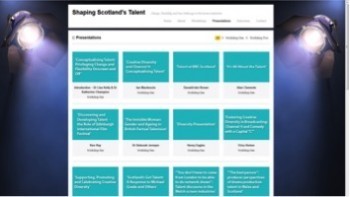In 2006, Richard Sennett published a short article in The Political Quarterly entitled ‘What do we mean by talent?’ Having carried out ethnographic research with workers in the so-called ‘New Economy’, or rather those in the financial sector, new technology and what he terms ‘media services’ (163), Sennett sought to examine the notion of talent in relation to meritocracy. On asking personnel managers what qualities they looked for when hiring mid-level staff and the subsequent criteria for promotion, they explained that rather than favouring workers who were skilled at one particular thing, they were looking for people who were ‘capable of learning new tasks as the institutions themselves took on new kinds of work’ or, as they described it, ‘surrendering their competence over any particular task’ (ibid). In practice, this meant being interested in people who were capable of learning foreign languages, something top business schools often look for: ‘If you study Greek as an undergraduate, for example, that’s a very good entree into a business school, because your choice indicates that you are capable of changing, getting out of normal contexts, and learning something that is strange and foreign’ (ibid). Maybe this isn’t so surprising, given that my mother was always telling me to learn a language at school as it would ‘stand me in good stead’ for the future. Needless to say I ignored her and still only know ‘un petit peu Francais’.
Sennett was more surprised by his other findings however, namely that if someone ‘is not promoted fairly rapidly within the organisation, particularly in their first five years, they are doomed’ (163-164). And, for those who have been in the same job for four or five years, well ‘that counts as a negative mark against them’ because they have become ‘institutionally ingrown and attached to a particular skill’ (164). Again, this does not bode well for my future.
As the author of The Craftsman (2008), Sennett (2006: 165) was perhaps particularly perturbed that the notion of ‘craftsmanship’ – the mastery of a particular skill – was being viewed in negative terms as leading-sector firms privileged change and flexibility, while talent and merit was being redefined as the potential to perform well in future circumstances rather than having practical experience in a specific role. Indeed, with those in highly mobile environments being viewed as becoming gradually deskilled if they learned to do one thing well over a long period, Sennett (164) found this to be especially true in media companies, where ‘people in their late forties and fifties, unless they become really mogul-like, and even though they’ve done long service in the firm, will end up working at an inferior skill level compared to young people who have just come in. There’s the presumption that the modal efficient age in media companies is between 32 and 38’. This suggests that the media industry is, to all intents and purposes, a young person’s game.
Sennett’s work is of interest to me for two reasons. First, it forms the basis of a research project I carried out last year with my colleague Katherine Champion, while both based at the University of Glasgow’s Centre for Cultural Policy Research. Entitled Shaping Scotland’s Talent: Change, Flexibility and New Pathways in the Screen Industries, we received funding from the Royal Society of Edinburgh for two themed research workshops designed to initiate dialogue between academics, policymakers and industry practitioners within Scotland’s screen industries and beyond (you can read more about the workshops from participant Erica Horton in her CSTonline blog). Second, the above description of the types of qualities privileged within highly mobile environments sounds increasingly like those prized within Higher Education, with academic labour and work culture being the subject of many CSTonline blogs in recent months. Thus, I will touch briefly on both of these in the remainder of this short piece, drawing attention to our original research and hopefully contributing to the ongoing conversation in this area.
As noted, Sennett’s work was a starting point for our project, particularly in relation to his question ‘what do we mean by talent?’ For example, despite both ‘creativity’ and ‘talent’ becoming somewhat ubiquitous within the policy context in recent years (DCMS 2008; European Commission 2010; Australian Government 2011; Scottish Government 2011), there has been little interrogation of the latter term. It also lacks a clear definition across industry and policy, with ‘talent’ referring to a wide range of industry roles and activities, both on and offscreen and above and below-the-line, and policy often focusing on ‘skills development’, despite using the language of ‘developing talent’. The Scottish context is also significant, given that a small country like Scotland finds itself competing within a highly competitive global landscape to both attract and retain screen talent and thus strengthen its skills base at a crucial time of political and technological change. Thus, by bringing together academics, policymakers and industry practitioners and stakeholders from across the UK’s nations and regions, along with European and US comparators, we sought to address the following key areas: conceptualising talent; examples of best practice; talent clustering; and new digital pathways.
Of course, this kind of outward-facing work also qualifies as knowledge exchange and has the potential for impact in the future, two qualities that are essential within the current Higher Education landscape. Taking part in the workshops were representatives of key broadcasters and institutions in the form of BBC Scotland, STV, Channel 4 and the Edinburgh International Film Festival. This was in addition to public agencies, trade bodies and industry organisations, such as Creative Scotland, Creative Skillset, BECTU and Women in Film and TV, alongside UK-wide academics and international contributors from New Danish Screen, the Carsey-Wolf Center for Media Industries at UC Santa Barbara and Stony Brook University’s digital filmmaking programme in New York. Since embarking on the project, we have also been asked to contribute to a number of KE events, and only this week took part in Creative Clyde’s 2015 Lyte Bytes series of ‘In Conversation With’ events, in which we engaged with companies from the creative industries sector.
While I don’t have the space here to fully outline the themes of the workshops and the discussions that took place, the presentations which accompanied the short position pieces can be accessed via our dedicated online resource www.shapingscotlandstalent.co.uk and an article summarising some of the initial findings will be published shortly in a special Early Career Researchers issue of Cultural Trends (Kelly and Champion, forthcoming 2015). Phew, that’s the promotional stuff out of the way. One point I do want to touch on however, which is not in the article but ties in with my earlier discussion of Sennett, is the challenges to traditional understandings of career paths, reward systems and the existence of a skills ladder that were highlighted.
Figures derived from the Higher Education Statistics Agency (HESA) and presented during our second workshop demonstrate that the jobs market tends to discriminate between academic disciplines. For example, defining success as securing a ‘creative job in a creative industry’, graduates not trained in a creative subject are more likely to secure creative roles than their counterparts from film, media and associated disciplines (Faggian et al, 2013). While this raises questions as to whether the types of skills developed within these courses are either not valued by employers or not communicated effectively enough (perhaps due to a continued lack of confidence within the subject area compared to other more established disciplines), it also supports Sennett’s findings that flexibility and the ability to adapt to change is more important than being trained in the field you wish to enter. Thus, studying languages is more ‘valuable’ in the creative industries jobs market than studying TV or media.
This leads me to my next issue which is the current Higher Education landscape, which I suggest also privileges ‘talent’ that exhibits flexibility and the ability to adapt to change and, if you’re not promoted within four or five years, prepare to be doomed! As I write this, I am currently on maternity leave, although I don’t technically have a job to go back to as, since obtaining my doctorate, I have worked on two fixed term projects funded by the AHRC, the second of which I completed before going off to have a baby. Yet, arguably, I’ve never been busier. Not only have I spent the last few months completing an article and book on the UK Film Council for my latest funded project (Kelly 2015; Doyle, Schlesinger, Boyle and Kelly, forthcoming 2015) but I have also been finishing the aforementioned talent article (Kelly and Champion, forthcoming 2015) and taking part in KE events, not to mention working on both funding and job applications. It is becoming increasingly difficult to capitalise on any of these (unpaid) activities however as, without a tenured position, it is impossible to apply for a large grant in your own name. Moreover, as a Media Studies graduate who completed my PhD in US sitcoms at the University of Glasgow before staying to work on funded research projects (although I at least changed subject areas), I do not exhibit the requisite ‘flexibility’ to secure a permanent position.
So, is it worth pursuing? I can’t answer that at the moment, although I am grateful for the recent debates around academic labour raised by Cathy Johnson, Karen Boyle and Richard Hewett in their CSTonline blogs and, of course, it hasn’t been too arduous doing all this work as it does tend to be, as everyone has highlighted, enjoyable. I also don’t deserve too much pity as I have not been sucked into the administrative hell that most academics I know regularly describe on Facebook. Moreover, although I’ve recently been working late most evenings, this is because I’ve been spending my days watching Horrible Histories and playing Star Wars with my 4 year old while being entertained by the attempts of my 4 month old to eat her toes. All I can say is that, having spent the last year engaging with people from industry and policy, I have discovered a world outside of academia that actually looks quite appealing. Perhaps there’s another sector then that will value my specific ‘talents’, e.g., a knowledge of American sitcoms and CBeebies programmes, while letting me stay in Glasgow – answers on a postcard please!
Lisa W Kelly is a Research Affiliate at the University of Glasgow. Her research includes work on television sitcom, business entertainment formats and UK film policy and she recently led a project on ‘talent’ in Scotland’s screen industries funded by the Royal Society of Edinburgh. She is co-author of The Television Entrepreneurs: Social Change and Public Understanding of Business (Ashgate, 2012) and The Rise and Fall of the UK Film Council (Edinburgh University Press, forthcoming 2015).





